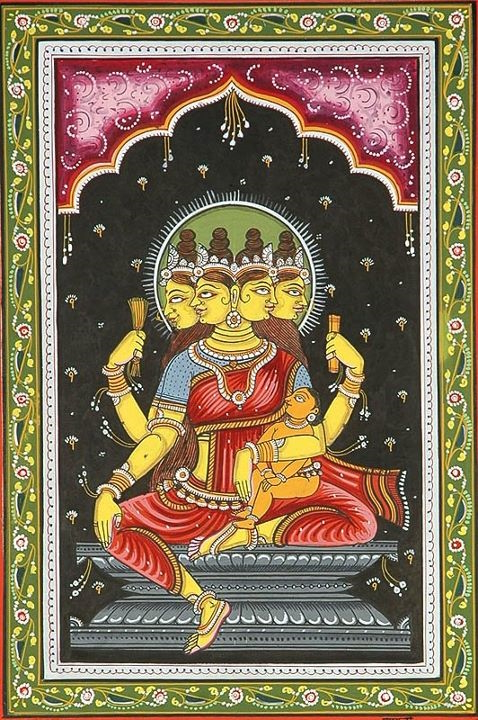 |

VEDIC KNOWLEDGE
 |
|
The Sanskrit word "veda" literally means "knowledge", therefore by "Vedic knowledge" we refer to the entire corpus of spiritual and material knowledge that is traditionally accepted as authentic and verified by generations of researchers who successfully applied such teachings in practice. This applies not only to the Veda Samhitas (Rig, Sama, Yajur, Atharva), but also to the other sruti such as Upanishads etc, and to most smriti such as Puranas, Bhagavad gita and Mahabharata, Ramayana, Tantra/ Agamas, Yoga shastra, Bhakti shastra, and even oral traditions when compatible with the basic principles of Dharma and Vidya. We also study the context of such expressions of knowledge, and compare it critically with the contents and context of other religious and cultural traditions along human history. For this reason we also study the history, documents and artifacts of other ancient cultures and the development of more recent cultures. In our studies, we follow the traditional Vedic approach rather than the conventional academic approach that is based on the colonial perspective. Our main focus is to distinguish the original Vedic knowledge from later superimpositions especially due to abrahamic and post-abrahamic influences. We also do not recognize any authority to sectarian commentators or speculative innovators who give their personal imaginative interpretations as a sort of registered trade mark method or system. There is no problem in recognizing the merits of their presentations whenever they are in accordance to the fundamental principles of Dharma and Vidya, but we do not consider their products as independent and self-sufficient proof. We constantly verify information by conducting honest research from the earliest and most universally accepted sources possible, quoting direct scriptural and archeological evidence to stimulate the proper use of individual intellect and wisdom, as well as practical application to desa, kala, patra. This is a very important and urgent work, because the foundations of the ancient Indian civilization constitute the only effective solution to the present-day serious problems of mankind. The proper application of such principles brings the perfect balance and integration between matter and spirit, scientific integrity and emotions, sense pleasure and serenity, and the other apparent dualities of the world. During the Vedic period and for many centuries after that, India remained famous as the happiest, most prosperous and peaceful place on earth - a vast land of fabulous wealth, inhabited by very wise and powerful magicians who lived among a very progressive general population. Vedic society was characterized by utmost freedom, complete harmony and cooperation among social classes, healthy family values, and full security under the selfless protection of competent rulers. The foreign visitors wrote in amazement in their travel records that Indian society had no slavery or poverty or mistreatment of people and even of animals. In her golden age, Vedic civilization spread as wide as to Iran and Singapore, peacefully establishing trade centers and settlements in available places, without any imperialistic war or conquest. Indian merchants sailed the seas as wide as China and Egypt, taking advantage of the monsoon winds and the favorable currents, and returned home carrying many travelers who were anxious to study in Indian universities. Alexander the Great failed in his campaign to conquer India because his soldiers were unable to fight against the incredible "magical" weapons of the Vedic warriors, but he carried back home a much more valuable treasure than he had even dreamt of: hundreds of texts of spiritual and material knowledge. To preserve, translate and study those invaluable texts, Alexander and his successors built the great Library of Alexandria, and around it, a wealthy and powerful city, that was for centuries greater and more glorious than Rome itself, and gave birth to the extraordinary cultural phenomenon of Hellenism - the fusion between the Greek and the eastern (Indian) cultures, that greatly elevated the previous local cultures. Unfortunately that glorious civilization was wiped away and buried under the dark centuries of the European middle ages, and only a few relicssurvived. The distant memory of the past glory and wisdom remained in the Latin motto, "ex oriente lux", meaning "the light comes from the East" which refers to more than the sun rising in the morning. For over 1000 years now the lands of Vedic Akhanda Bharata suffered many invasions, attacks, massacres and the systematic destruction of universities, libraries, temples and centers of culture and spirituality. However, for those who know how to search, there is still a vast wealth of knowledge and wisdom, preserved by great souls, honest scholars and true representatives of Sanatana Dharma. Such living tradition is now rising again, to survive and prevail over the final attack that is now threatening us all at global level. The danger does not come only from the globalization of the consumeristic/ commercialculture of the western type, from the resurgence of intolerant abrahamic fundamentalisms, or from the desperate and cynical nichilism of those who do not see any solution to the sweeping degradation of human kind. The religious movements and organizations, the philosophical and academic schools that study and teach the Vedic tradition today tend to present a perspective of knowledge that might be more or less correct, but it is usually quite sectarian. They do not allow researchers to verify the context, to develop a multi-dimensional general vision and to experiment the application of the theoretical concepts by taking them to the practical level of personal realization. This problem is particularly serious in the academic institutions where the study of the Vedic tradition is still approached from a colonial angle - from an alien and hostile perspective, meant to demonstrate defects in Vedic civilization even when do not really exist. The purpose of such biased presentations is to establish the superiority of their own ideology - secular, atheistic or based on some other faith. It is not easy to find an adequate presentation of Vedic knowledge even among those who consider themselves as faithful followers of its scriptures, because in the course of time the original Indian culture has been covered and distorted by cultural, religious and social superimpositions accumulated during the last several centuries. However, it is still possible. We invite you to participate directly in this wonderful enterprise. |
